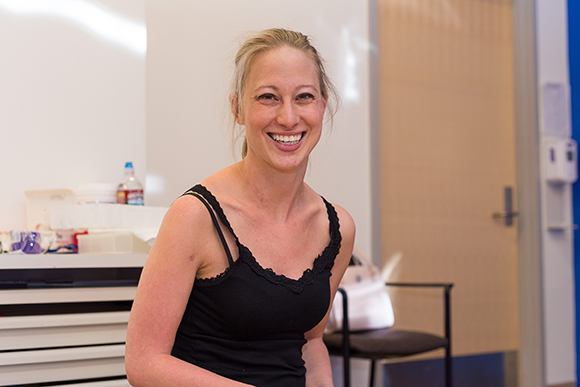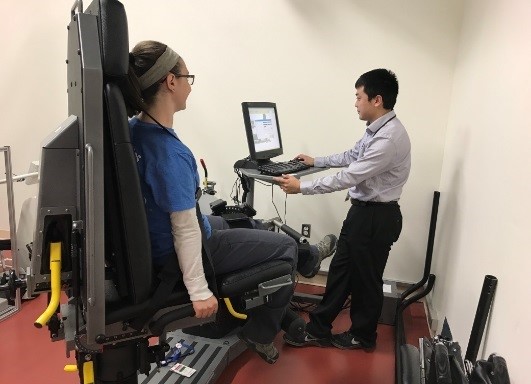In the News
-

Cerebral Palsy Doesn't Stop Her From DancingOpens in a new window
May 17, 2016Even though learning to waltz had been a lifelong dream for Sarah Cauley, she cancelled just one day before her first lesson. She was unable to open her hand enough for someone to hold it, and was afraid no one would want to try. “The words ‘graceful’ and ‘cerebral palsy’ are two words that are not typically used in the same sentence,” explained Sarah, an individual with spastic cerebral palsy. Watch Sarah dance today and you would describe her as graceful. Not only has Sarah become a competitive ballroom dancer, she is helping CU Anschutz researchers explore how cerebral palsy impacts health and mobility in adults.Opens in a new window Full story -

Study Looks at Gait in Cerebral Palsy PatientsOpens in a new window
Jan 16, 2016AURORA - Jillian August is walking 20-percent faster than she did 10 years ago. That is a huge accomplishment for a 24-year-old with cerebral palsy. "Even though cerebral palsy is a pediatric onset condition, it's a life long disability," Dr. James Carollo, Ph.D. said. "We need to be vigilant in being able to understand how cerebral palsy affects you over your life span." Dr. Carollo has worked with Jillian since she was a little girl. She was born with spastic diplegic cerebral palsy, an injury to a developing brain that effects gross motor skills and movement.Opens in a new window Full story

Patricia Heyn
Dr. Patricia C. Heyn has spent years studying how physical and cognitive activities affect cognitive function, especially for people with Alzheimer’s. This news article describes her journey.
Websites and Social Media of Dr. Patricia Heyn:
Author Related News Outlets
- Huffington Post Canada (November 22, 2018). To Decrease Dementia Risk, Get Up And Moving No Matter Your Age. https://www.huffingtonpost.ca/leigh-vanderloo/to-decrease-dementia-risk-get-up-and-moving-no-matter-your-age_a_23596446/ . (Accessed: 10/01/2019)
- Harvard Health Publications (June 08, 2017). Exercise versus caffeine: Which is your best ally to fight fatigue?, https://www.health.harvard.edu/blog/exercise-versus-caffeine-which-is-your-best-ally-to-fight-fatigue-2017060811843 . (Accessed: 10/01/2019)
- ALZFORUM News Outlet: Nonimmersive Brain Gaming for Older Adults With Cognitive Impairment. Online: https://www.alzforum.org/papers/nonimmersive-brain-gaming-older-adults-cognitive-impairment-scoping-review (Accessed: 10/01/2019
- Spotlight: Five Questions for Patricia Heyn. (December 01, 2016) CU Connections: University of Colorado Relations and President’s Office News and Information Online: https://connections.cu.edu/spotlights/five-questions-patricia-heyn
- Gerontology News (October 2015). The Gerontological Society of America. https://www.geron.org/images/gsa/gerontologynews/October_2015.pdf
- E NEWS (September 24, 2015). American Congress of Rehabilitation Medicine (ACRM NEWS). http://multibriefs.com/briefs/acrm/ACRM092415.php
- Heyn PC (2014). Cardiovascular Disease Risk Factors and the Risk for Alzheimer's Disease: what can we do to intervene? Rehabilitation Outlook; Vol.19 (4), Aug-Sept 2014: http://www.acrm.org/rehaboutlooksept14/cardiovascular-disease-risk-factors-and-the-risk-for-alzheimers-disease-what-can-we-do-to-intervene/ Official publication from the American Congress of Rehabilitation Medicine Rehabilitation published bi-monthly and distributed to over 2,000 members. Volume 19, NO.5, July/August 2014.
- Pallarito K . “Can Physical Cues Signal Dementia?” ABC NEWS: HealthDay Press; 16 August. Retrieved on 05/18/2014 from http://abcnews.go.com/Health/Healthday/story?id=5592134&page=3